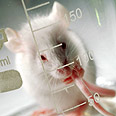
EU bans cosmetics with animal-tested ingredients
While animal rights groups cheer new measure, trade body representing European Union's €71 billion industry says ban 'acts as a brake on innovation'
"This is a great opportunity for Europe to set an example of responsible innovation in cosmetics without any compromise on consumer safety," said Tonio Borg, the top official on health and consumer issues for the 27-country EU.
Animal rights groups were quick to cheer the measure, but Cosmetics Europe, a trade body representing the EU's €71 billion ($93 billion) industry, said the ban "acts as a brake on innovation."
While the industry's rabbits, mice or guinea pigs used in testing will now be spared, consumers are unlikely to notice immediate changes because products containing ingredients that were tested on animals before the ban can remain on the shelves.
The 27-country bloc's executive arm, the European Commission, claimed the decision "is in line with what many European citizens believe firmly: that the development of cosmetics does not warrant animal testing."
The EU has banned animal testing of finished cosmetic products since 2004. The ban on cosmetics containing animal-tested ingredients was first decided four years ago but initially left loopholes for certain tests following resistance from cosmetics companies.
Animal rights groups such as Humane Society International cheered the EU's decision on the full ban as a major step in stopping animals' suffering, saying the bloc has now become "the world's largest cruelty-free cosmetics market."
The group also said it hopes the course taken by the EU – whose nations combine form the world's biggest economy – will soon be replicated by the global cosmetics industry.
The industry's European trade body, however, maintained the ban threatens the industry's competitiveness and comes too early because there is still no alternative for several specific animal tests to ensure all the ingredients' safety.
Cosmetics Europe chief Bertil Heerink said "by implementing the ban at this time, the European Union is jeopardizing the industry's ability to innovate," putting the 27-country bloc at odds with its own goal of fostering a knowledge- and science-driven economy.
The sector's European cosmetic companies had 2010 revenues of €71 billion, directly employing some 180,000 people, according to the EU Commission.
The Commission stressed it will engage with its trading partners – for example the United States or China – "to explain and promote the European model and to work towards the international acceptance" of the ban.
"The Commission will make this an integral part of the Union's trade agenda and international cooperation," it said.
The EU and the US are currently launching negotiations aiming at reaching a free-trade agreement.
New cosmetic products manufactured outside the EU containing ingredients that were tested on animals could still be sold in Europe, but only if producers are able to document their safety to EU regulators without using data gathered through animal tests, said EU health official Sabine Lecrenier.
Cosmetic products that contain pharmaceutical ingredients that have been tested on animals because of the EU's rules governing pharmaceutical products can also still be marketed in Europe.










